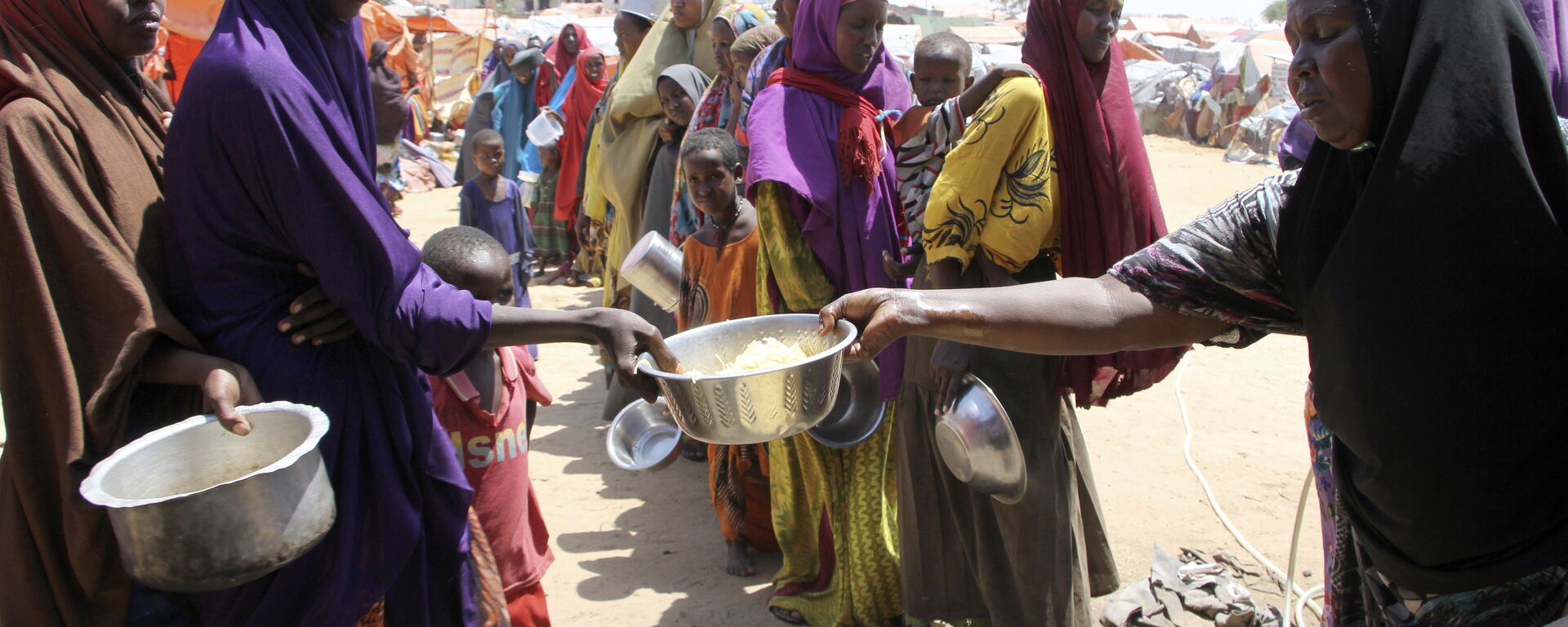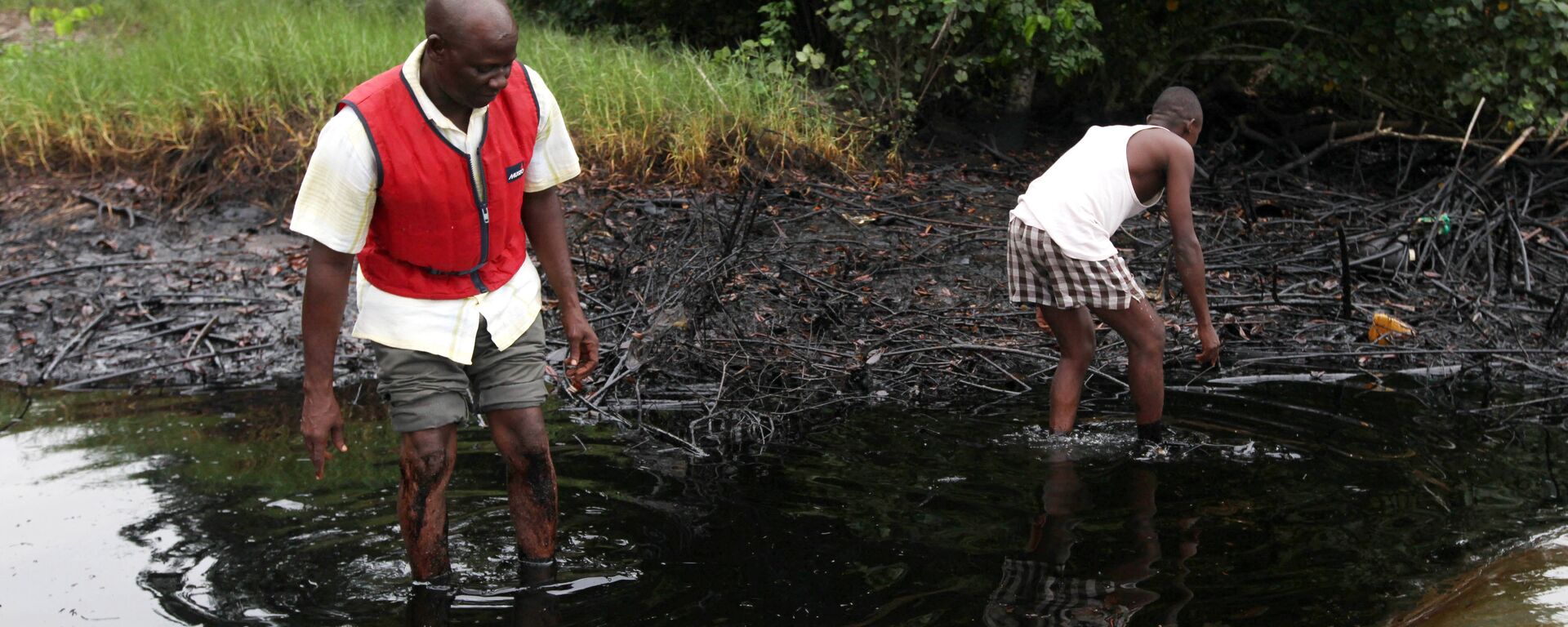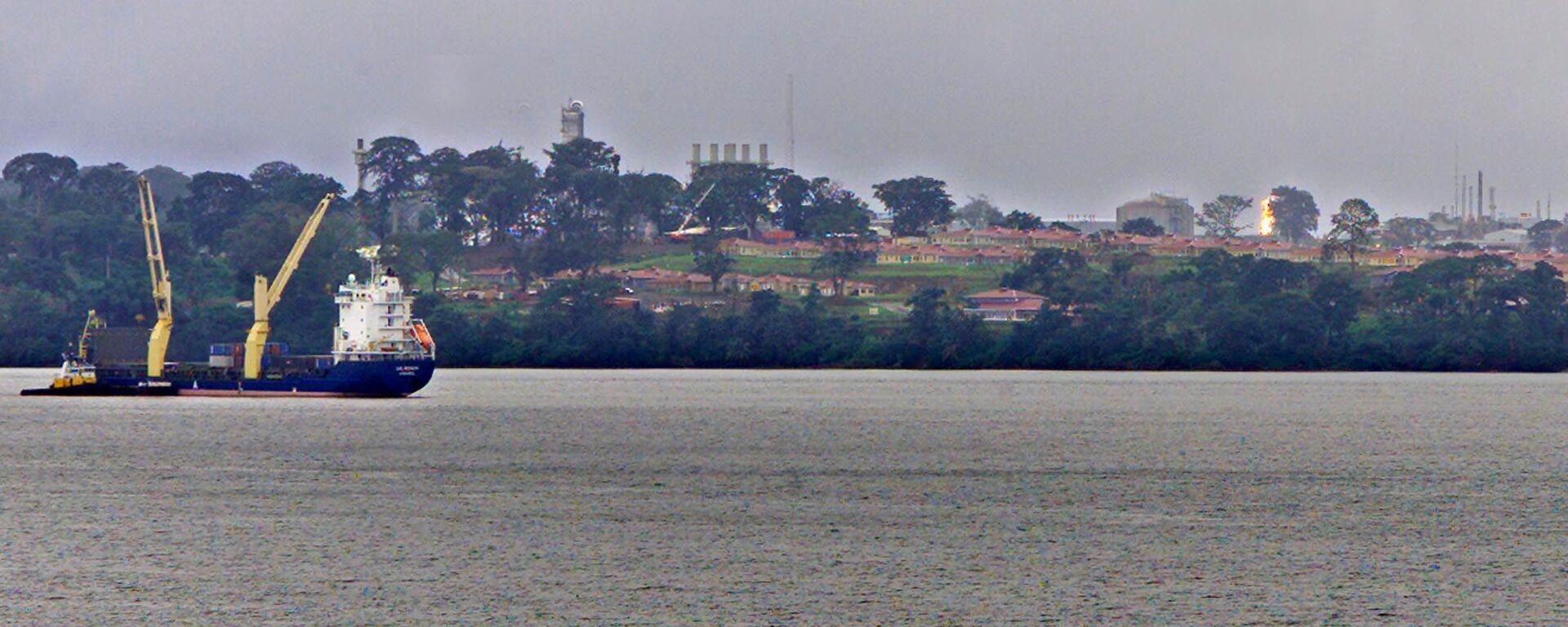How West Betrays Horn of Africa & Sahel’s Starving People
15:31 GMT 14.10.2022 (Updated: 11:36 GMT 23.11.2022)
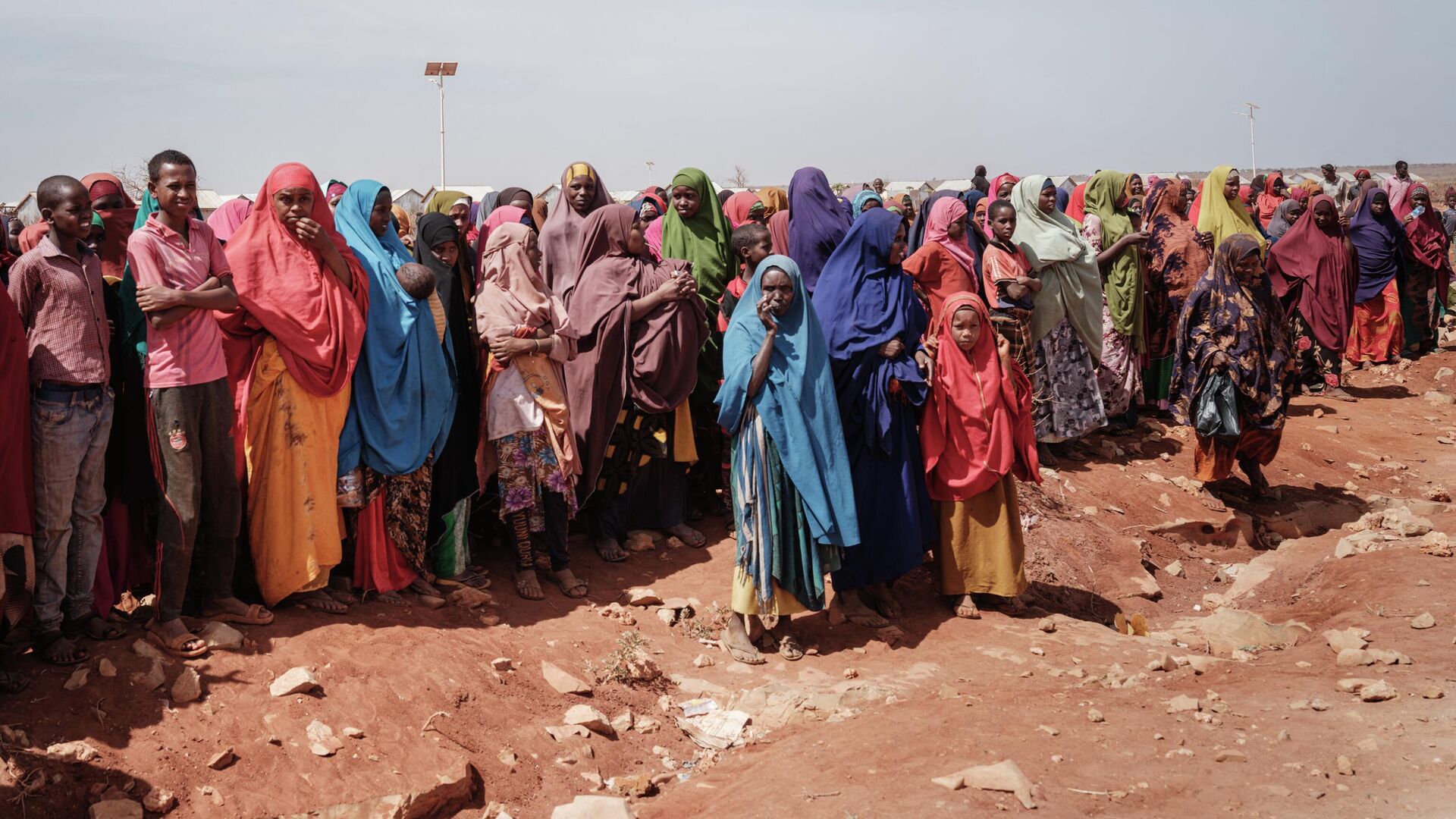
© AFP 2023 / YASUYOSHI CHIBA
Subscribe
The UK and other western nations have been ignoring impending famines in the Horn of Africa, hesitating to provide access to climate funds for poor African nations, the Somalian drought envoy told the Guardian earlier this week. "It’s all Ukraine, Ukraine, Ukraine. It gets all the political attention," he complained.
The Greater Horn of Africa is experiencing its worst drought in more than four decades and one of the worst hunger crises of the last 70 years, with over 37 million people facing acute hunger, according to the World Health Organization (WHO). The food crisis could worsen with a fifth consecutive failed rainy season anticipated between October and December 2022.
The hunger problem is caused by a number of reasons, according to Stanislav Mezentsev, senior research fellow at the Institute for African Studies of the Russian Academy of Sciences and vice president of the Asian and African Development Assistance Foundation.
"These are climate changes that lead to a tightening of climatic natural resources, there was little rain, now it ceases to fall at all, a drought sets in," said Mezentsev. "Small agricultural areas of cultivated land are drying up, people are left without food, livestock starts to die, and this leads to famine. And the second problem is the impossibility of a competent redistribution of aid, because in these countries, due to the fact that there is hunger and instability, terrorist groups are widely active, in particular, the Al-Shabaab* movement, which behaves aggressively."
Terrorists conduct attacks on humanitarian workers, intimidate international charitable organizations and disrupt rescue operations which lead to further problems of internal political instability and displacement of people, rebellions and revolutions, the Russian academic summed up.
Climate Change Agenda Crippling Africa
"If we talk about what is happening in terms of climate and why these droughts [occur], they are actually a cyclical phenomenon in Africa in general and especially on the Somali Peninsula," Mezentsev explained. "A severe drought occurred in 2011. There were lots of victims, millions of displaced persons. This is a natural cycle."
Still, the emerging climate change trend also plays a role: Mezentsev regularly visits the continent and sees how the change of seasons and climatic lines affect the frequency of rainfall in East Africa and increase the odds of worsening drought.
While Africa accounts for the smallest share of global greenhouse gas emissions, at just 3.8%, it is reaping the whirlwind of ecological problems triggered by the industrial development of the Global North, according to the academic.
At the same time, western nations are warning Africans against capitalizing on their fossil fuel reserves to facilitate the continent's development, including in the agricultural sector, citing climate change.
"During the colonial period Africa was exploited: resources were exported from there in order to support the economic development of the European metropolises," the academic said. "Now that they themselves have reached a high level of development, they tell Africans, that there's no need to use coal, no need to use oil, gas, it is necessary to switch to green renewable energy sources."
However, this approach prevents African countries from eradicating energy poverty and upgrading their agricultural technologies. "The main brake on development (…) of the African continent is the lack of energy, because electricity, energy, is the engine of all progress, it is the circulatory system," noted Mezentsev.
Africans could have switched to green technologies and renewables but it requires huge investments in new infrastructure, according to the academic. Given that most African nations don't have financial resources to leapfrog fossil fuel and exploit renewables, every country is trying to solve its energy problem on its own. While Ethiopia could use hydro-electric plants being one of the richest countries in water reserves, Somalia has no other alternatives except diesel fuel, Mezentsev noted.
"Diesel [produces] the same emissions that then lead to further droughts and so on," he said. "This is such a tangle of contradictions that are layered one on top of the other. Trying to solve one problem, Africans become a hostage to another dilemma."
Africa's Famine Roots Originate in Colonial Past
While droughts are a longstanding natural phenomenon in the Horn of Africa, famines largely stemmed from colonial and post-colonial era in the region, according to William G. Moseley, DeWitt Wallace professor of geography and director of the Program for Food, Agriculture & Society at Macalester College, US.
"Rainfall has long been highly variable across the Horn and Sahelian regions of Africa and farmers and herders had developed systems to deal with this variability," said Moseley, who also sits in the UN High Level Panel of Experts for Food Security and Nutrition.
"Historically, farmers stored surplus grain in good years to get them through difficult ones and planted a diverse set of crops, with different moisture requirements, to ensure that at least some harvest was produced each year. Herders were also highly mobile across broad areas, a strategy that responded to the patchy rainfall patterns of Africa’s dry lands. Beyond the household level, communities and kingdoms had contingency stores of grains and kin networks that provided mutual aid in times of scarcity."
Many of these strategies were disrupted in the colonial period as British and French colonial regimes – less the case for the Italians – employed head taxes (which had to be paid in cash) as a tool to force local farmers to grow more cash crops and store less surplus grain, explained the professor.
"Some herders were also encouraged to abandon their animals in favor of farming, or to develop fenced-off ranches," Moseley continued. "Unlike the pre-colonial era, when taxes were often used – in part – by African empires to build social safety nets, the cash crops and surplus value extracted via taxation in the colonial period were sent off to distant European power centers. Over time, this crippled local people’s risk management strategies, making them increasingly vulnerable to the ravages of drought, a situation that had once been treated as manageable climate variation."
It did not change for the better in the post-colonial period: "Under the banner of the New Green Revolution for Africa, development organizations have pushed for an increasingly commercial, high external input agriculture which involves the use of improved seeds, inorganic fertilizers and pesticides," the professor underscored.
As a result, this approach boosted yields for a narrow range of crops, marginalizing the poor and creating a system that is more vulnerable to drought, according to the academic. Currently farmers often purchase inputs on credit, become indebted when harvests are poor and must sell their crops to settle bills. Eventually, this practice undermines any effort to surplus production for a future year, the professor pointed out.
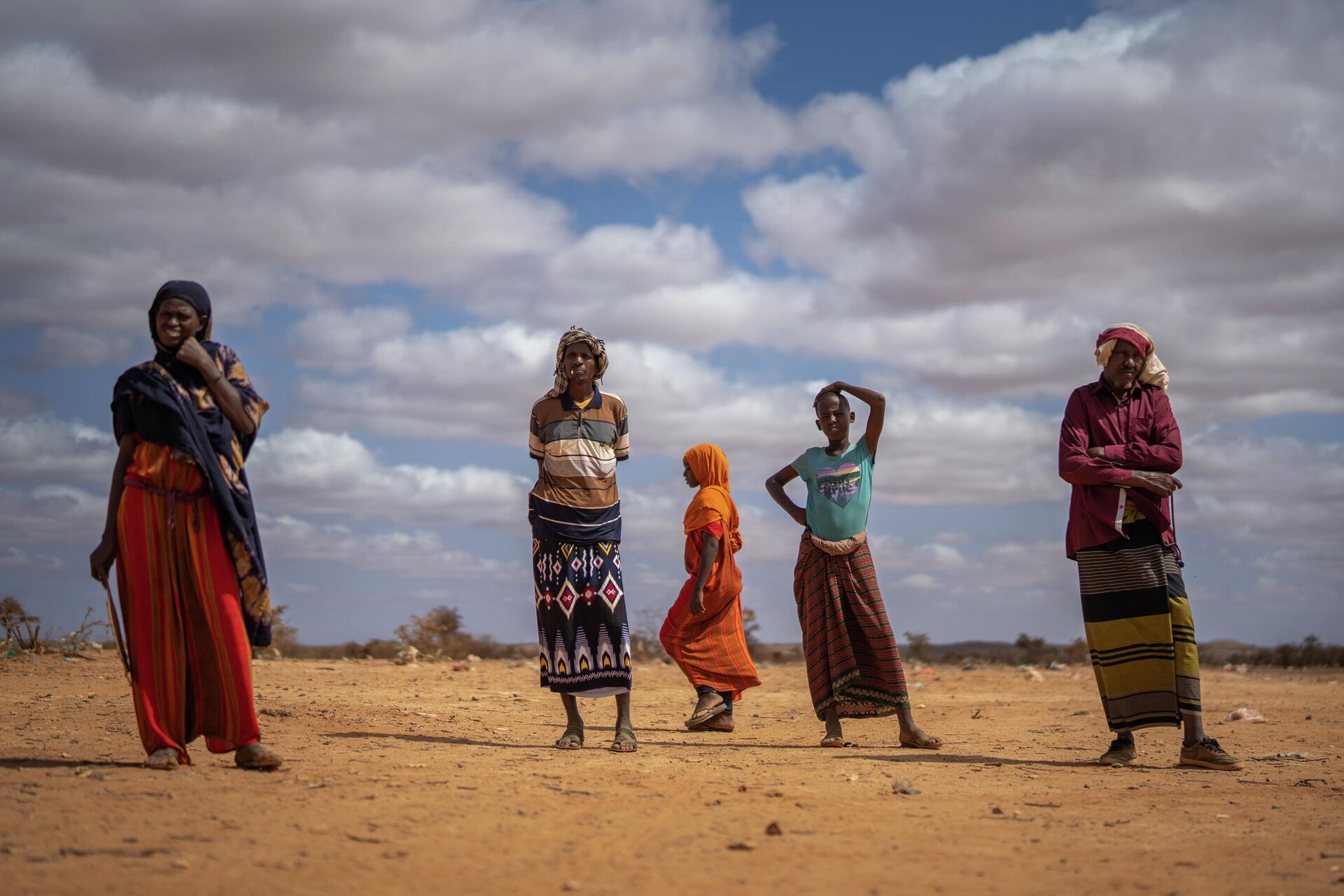
Men and women stand at a camp for displaced people on the outskirts of Dollow, Somalia, on Monday, Sept. 19, 2022.
© AP Photo / Jerome Delay
West Funneling Billions to Kiev Regime Instead of Aiding Africa
Despite evidence showing Western nations are in many respects responsible for the unfolding food crisis in the Horn of Africa and the Sahel region, they are not rushing to the rescue of their former satellites. At a conference in Giza, Egypt, on Wednesday, in the run-up to next month’s UN climate summit, Egypt’s special representative for COP27 attacked wealthier nations for not honoring an agreement to provide $100 billion a year to developing countries by 2020.
"The ravages of climate change are being felt in all regions of the world and more so in developing countries where mitigation largely relies on assistance from the developed world," underscored Olubunmi Omotesho, professor of agricultural economics, University of Ilorin, Nigeria.
Earlier, on Monday, Abdirahman Abdishakur Warsame, the presidential envoy for Somalia’s drought response, lamented the fact that the UK and other western countries appear to pay little if any attention to the climate-related drought and food crisis in Somalia and the Horn of Africa. Abdishakur told the Guardian that European politicians are focused solely on Ukraine and fail to meet their obligations to financially support suffering African nations. Since the beginning of Russia's special military operation to demilitarize and de-Nazify Ukraine, the US and its European allies pledged billions in weapons for the Kiev regime.
"This money is now being spent on strengthening the building of a system of struggle against Russia and its allies," said Mezentsev. "Now it’s not up to saving the hungry, all resources are being redistributed to their own salvation, as well as to countering Russia."
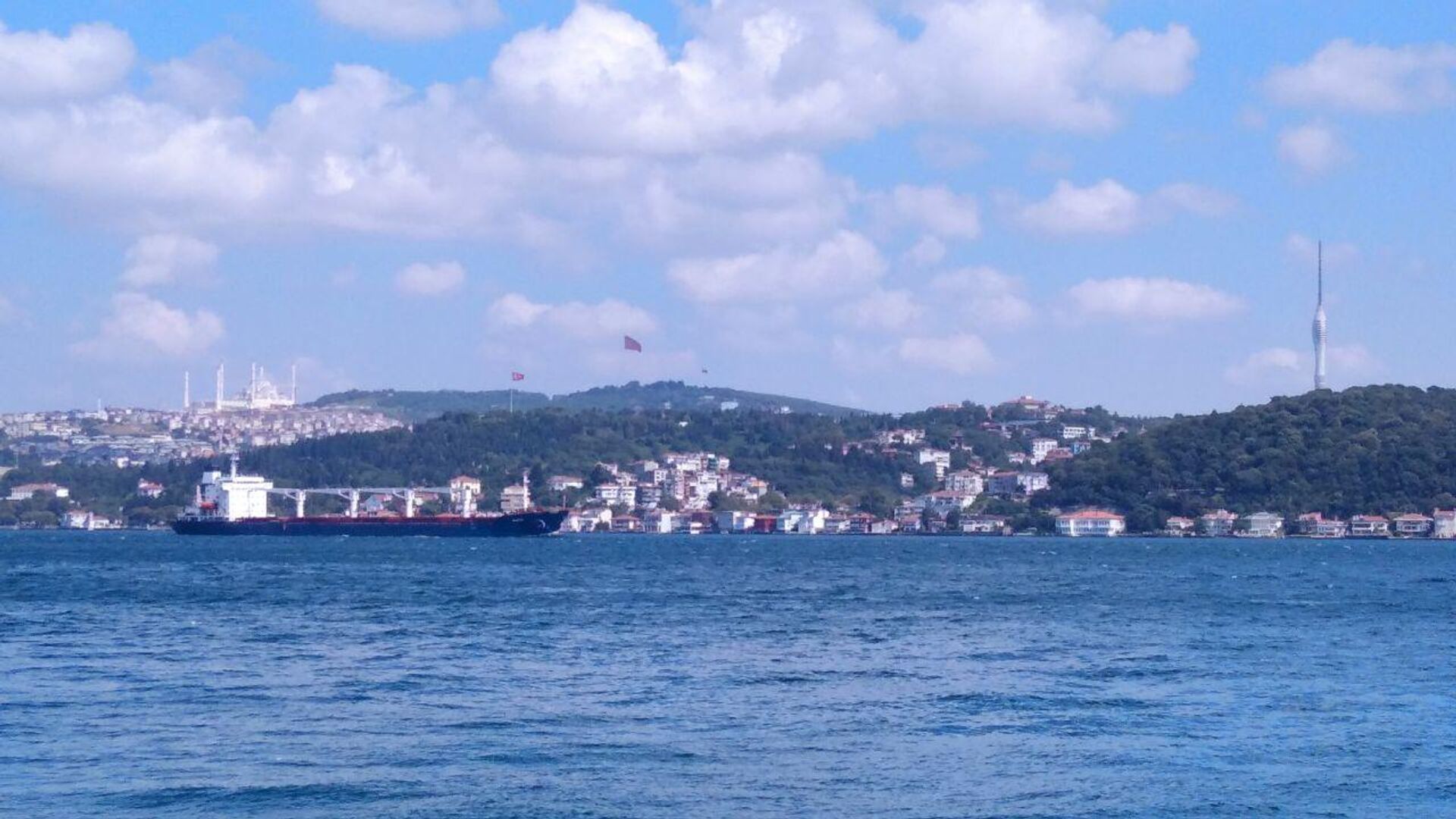
The first commercial vessel that left Ukraine under the Black Sea grain deal was inspected in Istanbul on Wednesday and cleared to proceed to Lebanon, the Joint Coordination Center (JCC) said
© Sputnik / Maksim Durnev
To make matters worse, the western anti-Russia campaign exacerbates the food crisis in Africa.
"One of the most painful consequences of these sanctions is that Russia's maritime communication with African countries has been actually interrupted," he said. "Transportation, including food, fertilizers and other Russian goods to Africa was carried out through international intermediaries, and logistics was also provided by international intermediaries, such companies as [Danish shipping company] Maersk and others. Now, under the sanctions, they have stopped transporting Russian goods."
Sweeping sanctions on the Russian logistics and financial system added further hurdles and de facto paralyzed shipping of Moscow’s grain and fertilizers to the Global South. Russia provides around 17-18% of wheat to the global market, while its share of fertilizers such as nitrogen, potassium and phosphorus accounted for 15%, 19% and 14%, respectively, in 2019. Under the Russo-Ukraine grain deal struck in Istanbul earlier this year, the UN was obligated to help unfreeze Russian food and fertilizer exports to third-world countries. However, the EU has not loosened its sanction regime so far. When it comes to Ukraine's grain, only a fraction of it went to Africa with a larger part being guzzled up by European states.
In early September, Russian President Vladimir Putin announced that Moscow is ready to provide 300,000 tons of fertilizers to developing countries free of charge and urged the UN to push the EU to lift its sanctions which block Russian exports. At the same time, Russia is set to harvest up to 150 million tons of grain, including 100 million tons of wheat, this year. By the end of September, the country had gathered 138.7 million tons of grain.
"We are accused of creating a threat of starvation by launching a special [military] operation [in Ukraine], and thus disrupting the supply chain of fertilizers and grain to African countries, including especially the Horn of Africa," Mezentsev said. "However, this is another attempt to shift the blame from the guilty to the innocent: the supply logistics were interrupted precisely because we were deprived of these logistics."
How Russia Can Help Africa to Become Self-Sufficient
African nations have to take the responsibility for their future in their own hands and minimize reliance on western states, including the UK, according to Akinyinka Akinyoade, senior researcher at the African Studies Center at Leiden University, the Netherlands.
"My view is simple: Africa’s homegrown solutions, designed, owned, and activated from within will arguably be more long-lasting than the eternal wait for access to a $100 billion fund to mitigate the crisis," argued Akinyoade. "Millions of children will be saved when political fragility bedeviling some of the areas is minimized. This will allow hotspots of soil and water conservation to thrive and expand."
This does not mean, however, that Africa should cut ties with the West, according to Dr. Fatuma Ali, associate professor of International Relations at the School of Humanities and Social Sciences of the United States International University in Nairobi, Kenya. There are still lots of areas where African states could cooperate and maintain partnership in terms of trade and investments with western countries, she noted.
Meanwhile, she placed emphasis on the diversification of international relations by African regional players, citing potential Russian assistance in eradicating the food crisis and negative consequences of climate change.
"Russia can help African countries by urgently responding to the drought as an emergency with humanitarian aid (food, tools, finance and knowledge transfer)," Dr. Ali underscored.
According to the academic, Russia could also assist in:
• generating innovations to transform food systems and landscapes so that they sustain these countries organically, drive prosperity, and feed their people during a climate crisis;
• generating security-sensitive climate, land, food, and water systems science and evidence with ongoing efforts to address socio-political security, stability, and peace in supporting policy, programs and finance;
• addressing knowledge gaps with regards to the relationship between climate change and food security;
• developing climate security-sensitive operations/programs in agricultural, fishing and pastoral settings.
Russia possesses necessary resources, experience and best practices to address drought, food, energy and climate change issues, according to Mezentsev.
"[Russia can] provide consultations and create a balanced energy agenda for African countries; [it can] transfer modern technologies [to Africans] in order to develop renewable and traditional sources of electricity generation, which is the drive for the development of agriculture and industries in these countries, and rising living standards," Mezentsev said. "Russia has rich experience, starting with the use of coal-fired generating stations (a simpler and faster way to solve problems) and ending with the most modern nuclear power plants, which we are now actively promoting, including on the African continent."
When Africa's energy infrastructure is built and the economy gets a boost, Africans will be capable of solving their climate problems independently, through the transition to more serious, more efficient energy systems, the academic concluded.
*Al-Shabaab is a terrorist organization banned in Russia and many other countries.

